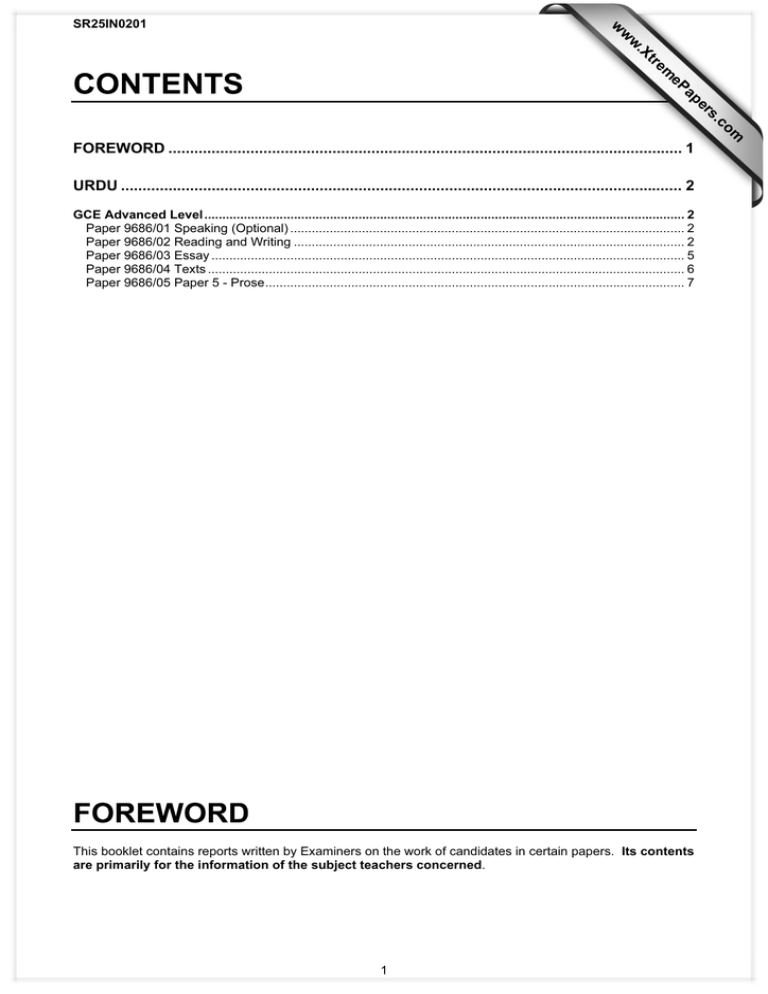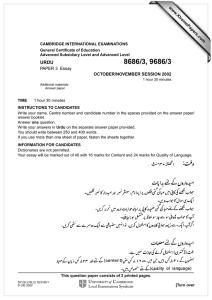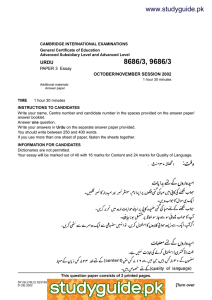www.XtremePapers.com
advertisement

w w SR25IN0201 ap eP m e tr .X w URDU .................................................................................................................................. 2 GCE Advanced Level ...................................................................................................................................... 2 Paper 9686/01 Speaking (Optional) .............................................................................................................. 2 Paper 9686/02 Reading and Writing ............................................................................................................. 2 Paper 9686/03 Essay .................................................................................................................................... 5 Paper 9686/04 Texts ..................................................................................................................................... 6 Paper 9686/05 Paper 5 - Prose..................................................................................................................... 7 This booklet contains reports written by Examiners on the work of candidates in certain papers. Its contents are primarily for the information of the subject teachers concerned. 1 om .c s er FOREWORD ....................................................................................................................... 1 GCE Advanced Level Paper 9686/01 Speaking (Optional) There were no entries for this component. Paper 9686/02 Reading and Writing General comments This is the second series of this examination, the first was held in June 2002. This Paper is designed to test candidates’ understanding of written Urdu and their ability to write accurate responses to text-based questions and their ability to write accurate and concise Urdu in response to given stimuli. Overall, the performance of candidates was good, with a high proportion of excellent scripts. The problem for most candidates is not writing Urdu but answering the questions in accordance with the given rubrics. Comments on specific questions Question 1 This required candidates to write their own sentences illustrating clearly the meanings of words taken from the first text. This was mostly well done, with most candidates scoring at least 4 out of 5 marks. Where candidates lost marks was either if they copied a sentence from the text, such as: which is almost identical to the sentence in the text, or wrote a sentence like: which does not illustrate the meaning. There were even a few candidates who changed the word to which again did not score a mark. On the other hand a sentence like: does clearly illustrate the meaning of the word. 2 Question 2 This required candidates to give the opposite of five given words. Most candidates scored 4 or more marks. The word that caused most difficulty was: This is a noun meaning ‘worry’. Many candidates wrote for its opposite but this compound word is an adjective, not a noun. is the nominal form. Question 3 The five questions in this section were based on the given text in Passage A. The text, which was adapted from a passage by Maulvi Abdul Haqq, was about a gardener devoted to his plants. Candidates were expected to write concise answers as far as possible in their own words. The importance of observing this rubric cannot be over emphasized as far too many answers are simply lifted from the text with minimal alteration, or there are more than six lines of response, and in some cases well over 100 words. This type of response does not get good marks at O Level or at A Level. All these questions can be answered simply and concisely in, at most, two sentences. Taking (a) as an example, the questions asked: What was the gardener’s relationship with his plants, and why? Put simply in Urdu the reply should be: He treated his plants like a parent his children, because he had none of his own. Even when, as in (b) the question asks for details, it is not necessary to spend eight or ten lines writing out everything in the text. This is concise but gives every necessary detail. Both (c) and (d) were quite well done except for the point about length and own language. Comprehension is not the issue here because there were very few candidates who did not understand the text or the questions, it is the quality of the responses. (e) asked candidates to give their own impression of the gardener, based on the text. The problem with this was that far too many candidates wrote far too much, in some cases as much as the length of the original passage. This will, of course, not receive good marks. Five marks were available in this question for overall linguistic standard. Most candidates scored 3 or more. While a high proportion of candidates could write excellent Urdu, if they did not use much of their own language they could not receive good marks for use of language. Question 4 As in Question 3 the candidates had to write responses to five questions based on Passage B. The passage concerned some of the problems faced by the West as a result of intensive agriculture and overreliance on chemicals. Most candidates displayed excellent comprehension of the text but some let themselves down by not following the rubrics. A good example here is in (a) which asked: Why are meat eaters in the West worried about eating beef? 3 A concise response was: Because they fear they might get Mad Cow Disease. Rather too many candidates wrote out, more or less verbatim, the sentence that runs from the second half of the second line of the passage until the start of line five. The same problem afflicted many of the responses to (b) and (c). (d) was somewhat different because the answer could not be taken directly from the text, but had to be inferred and deduced. The question read: Why did the author write that agriculture had become an industry? The response should have been something on the lines of: Because agriculture had adopted the use of chemicals to get as much production from the soil as possible. Again there were many responses spoiled by copying out much of the text from lines 12 to 15. (e) asked candidates to consider the author’s purpose in writing the article. This was quite well done because candidates could not ‘lift’ an answer from the text. The main problem here was length. The longest response was well over 200 words, which is by no stretch of the imagination concise! A good response was something like: The author wrote the article to make people aware of the dangers of using too many chemicals in farming which are poisoning the land and the people. Again five marks were available for linguistic accuracy. While most candidates scored 3 or more because a high proportion of them could write excellent Urdu, if they did not use much of their own language they could not receive full marks for language. Question 5 This last question required candidates to write a response to a question referring to both texts and to give their opinion on a question arising from the texts, but not directly so. The quality of these responses was in some cases excellent, and the majority of candidates performed at least adequately in these tasks. The first task was to write about how problems mentioned in the second text could be solved using what had been mentioned in the second, in other words how the problems resulting from unrestricted chemical agribusiness could be solved by using traditional organic methods. The second task was to give their opinion as to why traditional herbal medicine is making a comeback. Candidates clearly understood the tasks in the vast majority of cases and most were able to write an appropriate account of the problems and their solution(s). The opinions given on herbal medicines were, in some cases, very cogent and valid. What let many down, however, was the fact that they ignored the rubric to write about 140 words overall. Many candidates wrote well over that on each task, and in some cases read “Quality of Language” as a further task to write about whereas it was a note on the award of marks for quality of language! Conclusion While the overall performance was good, with most candidates displaying very good comprehension skills and good writing skills, it would have been much improved by stricter observance of the rubrics relating to the use of candidates’ own language and sticking to the prescribed word limits. 4 Paper 9686/03 Essay General comments This is the second series of this examination, the first was held in June 2002. Comments on specific questions Essay As has come to be expected, the composition question produced a range of performances, from the excellent to the ordinary. The weakest do contain spelling errors, a narrow vocabulary and poor syntax, but serious language errors are rare. The standard of language used is always adequate for this level, most marks being lost in the layout, organisation and content of the essays. Most candidates managed to write around the prescribed number of words (250-400). It is important that candidates use their time well and stay within the prescribed number of words. Planning, structure and argument are essential components of essay writing, but it should be noted that it is not necessary for candidates to write planning notes. Many candidates did however, and it seems indicative that those who do tend to be the ones who go on to write well-planned compositions. There were a few candidates who misunderstood the instructions. Each essay title is written under a general heading, such as “War and Peace”. Under this is written an essay title relating to this Topic heading. A few candidates wrote essays based on the heading and not the title as stated in the syllabus. The most popular title this year was: “The importance of women’s education in your country” which comprised nearly 40% of compositions. This topic produced some very satisfactory responses, but very good ones were thin on the ground. Although most candidates were linguistically up to the task, what was lacking in many cases was a coherent structure. Many candidates simply rambled on about how education was good for women and that the government should do more. Some of the better ones, for example, gave the topic a historical and cultural framework, used religious injunctions concerning education to stress its importance, demonstrated the social and economic benefits, and outlined what was needed to improve the situation. The next most popular topic was: “Technology has drawn the world closer together.” What this title tended to produce was a long list of technological innovations, ranging from writing to computers and the internet, via telephones, radio and television. The few that stood out were those who considered the negative as well as the positive aspects of modern technology and its effect on people and their cultures. Some of the most interesting compositions were written on some of the least popular topics. The reason for this is probably that candidates who chose these topics have a clear opinion or point of view which they wish to express. This was abundantly clear in some of the essays on “The role of the United Nations in peacekeeping.” 5 This is a particularly relevant and topical issue in Pakistan, where the UN has been operating for over half a century. It was in topics like the above that some candidates were able to introduce the topic, explain the situation, compare several possible factors, expand on them logically and to draw a clear conclusion. Candidates produced some heartfelt and very mature essays on this subject. Overall The linguistic standard of compositions was good, with only a very few candidates unable to write Urdu sufficiently accurately or coherently to score good marks. It is the use of a wide range of structures and appropriate lexis that lifts an ordinary essay above the rest and there were some candidates who wrote beautiful Urdu, illustrated with relevant quotations. Paper 9686/04 Texts General comments The overall impression is that candidates were fully prepared to meet the demands of this Paper. With this syllabus in its second year it is evident that most Centres have achieved the right balance between the various skills in their teaching programs. The overall standard was exceptionally good. There were a few examples of candidates having learned – and thus reproduced - longer questions, but generally and more appropriately, candidates referred closely to the text and used simple and short quotations in support of the argument of their essays. The key criterion for success is close knowledge of the text, and those candidates who know their texts well in terms of both subject matter and style were those who did well. Other popular types of questions were those which referred to the presentation of the characters by the writer, again such questions require candidates to examine characters as constructs. Narrative and descriptive approaches to character are therefore inappropriate and do not meet the requirements of the assessment objectives. There were not too many prepared answers in evidence, though some candidates were clearly answering a previous question, not the one set. Addressing the specific requirements of the questions seemed to cause some candidates difficulty. In all cases where candidates chose an alternative focus for their answers they could not possibly be successful. Candidates should practice adjusting the length of their answers to meet the demands of the question and its mark allocation. By writing too much or too little candidates risk wasting time and losing valuable marks. This Paper was well done by the majority of candidates, who appeared to have been well prepared for the examination. Candidates grasped the implications of the questions quite well, and on the whole they succeeded in matching their chosen text to the question very aptly. 6 Paper 9686/05 Paper 5 - Prose General comments This Paper has only one question on translation from English into Urdu. The passage was a reasonable one that tested the candidate’s linguistic ability and translation skills. The candidates generally performed very well in this Paper and achieved good marks. Some candidates faced some difficulty in understanding and making an idiomatic translation of some phrases such as ‘married with a son’ and ‘imagine what a different outlook you’d have’. Some vocabulary was also found difficult to translate by some candidates, like ‘north-eastern’, ‘privileged’ and ‘eventually’. 7




